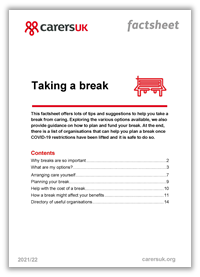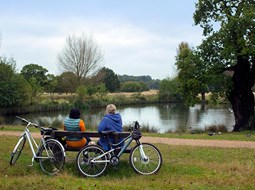Finding time to relax
When you’re caring for someone it can be easy to keep putting their own needs before your own. However the benefits of taking a break should never be underestimated – whether this might be a dose of meditation, seeing friends or a trip away.
Whatever you do, finding some ‘me’ time to relax and unwind is so important for both you and those you care for. We suggest different ways to achieve a break and offer further sources of support.
If you’re feeling exhausted from caring, taking a break – in whatever form – can be a great way to boost your health and recharge your batteries.
Spending time apart could be beneficial for the person you care for too. They may not take to the idea at first but having new social interactions and a change of scenery could also give them a fresh perspective and a lift.
It could also improve your relationship by giving you new experiences to talk about and remind the person you care for how much you do for them.
For more on this topic, watch our breaks video series, where carers offer their top tips and advice for taking a break.
Everyone’s needs are different and it may be helpful to take a step back to assess what would work for you. Some people would benefit from an hour each week, a day here and there or a week or two for a holiday.
Understandably this will largely depend on the needs of who you are caring for. Some carers choose to go on holiday together with the person they care for – sometimes with a paid carer – or some stay at home while the person they care for goes away or stays with friends.
First of all, you may wish to consider how you would cover the needs of the person you care for.
To get additional paid for cover or support, the first step would be to arrange an assessment for yourself as a carer. See our carer’s assessment section for details of what this involves. The person you care for would then also need to be assessed for reviewing what alternative care (respite care) can be put in place to help you take a break.
Our Taking a break factsheet offers further details on how to get an assessment. It would involve contacting social services in England and Wales, the social work department in Scotland, or your local Health and social Care Trust in Northern Ireland.
Arranging care yourself: You may prefer to organise cover yourself directly through:
- employing a paid care worker (directly or through an agency) to provide cover at your own home
- paying for the person your care for to have short-term residential care
- arranging a holiday for the person you are looking after or for both of you together.
See our Taking a break factsheet for more details on each of these options.
Getting away: Not everyone has the option to go away but if you do want to explore this possibility, there are many organisations that can help from grant-giving charities to specialist holiday caterers. See the listing of useful organisations in our factsheet Taking a break – pages 15-19.
Friends and family: Don’t be afraid to reach out to family members or close friends if you need some additional support. Even if they are unable to look after the person you care for, they could perhaps ease some of the pressure on your shoulders by, for example, by offering to do your shopping or running other chores now and again to give you a break.
Seek advice: Contact our Carers UK Helpline as a starting point to explore your individual circumstances and what options may help. Email advice@carersuk.org or watch this video to hear tips directly from our Carers UK advisers.
Our Jointly app is a good way of keeping in touch with relatives and balancing out these responsibilities.
Useful relevant organisations: There are many organisations, from condition-specific charities to holiday associations, that can offer support on taking a break. See our breaks factsheet for some examples.
Respite care can be provided through:
- residential or nursing care – where the person you are looking after has a short stay in a residential or nursing home
- a day-sitting service – allows you a break to go shopping, meet up with friends or have time for yourself
- a night-sitting service – where someone will come into your home to allow you to have a proper night’s sleep
- day care – where the person you are looking after goes to a day centre or takes part in activities away from home allowing you a break from caring
- holidays – help and support for when you want to go on holiday by yourself or with the person you look after
- direct payments – cash payments from the social services / social work
department. A person with a disability or ill health can be paid a direct payment following an assessment so that they can arrange and pay for their own care and support services. They can therefore receive a direct payment to pay for the alternative care they will need while their carer takes a break. You can find out more about direct payments here.
Paying for respite care
The social services / social work department of the person you are looking after may charge them for any respite care services provided (although not in Scotland if the respite care is arranged through a carer’s assessment).
They may also charge you for any carer’s services they provide to you (although carers cannot be charged for support in Scotland and it is not common practice in England, Wales and Northern Ireland).
If they do charge, they must follow guidelines about how income/ capital is taken into account – you should be told about this when the assessments are carried out.
Short-term residential care or a holiday for the person you are looking after
If you need to arrange short-term residential care for the person you care for, your local social services / social work department could help you decide which service to use, as well as the following organisations.
In England you can contact the Care Quality Commission. In Wales you can contact the Care and Social Services Inspectorate Wales. In Scotland you can contact the Care Inspectorate. In Northern Ireland you can contact the Regulation and Quality Improvement Authority.
If you would like to arrange a holiday, there might be an organisation or charity that could help to arrange or fund this. See our Taking a break factsheet for a list of organisations and their contact details.
To be able to relax and have peace of mind while on a break, you'll want to ensure the person you're looking after will be in safe hands and happy while you're away. Good planning in advance can make all the difference.
This checklist could help:
- Provide all the necessary information for the person who is providing alternative care. This may be something as straightforward as what the person you care for likes to eat, and when their mealtimes are, to more complex information about any medication they need to take.
- Leave a list of contacts. These should include the doctor’s number and other professionals involved in the care of the person you are looking after, contact details of nearby family members and friends, and your own number, in case of emergencies.
- It's a good idea to have an emergency plan. Setting out what should be done in an emergency, make sure you go through the details of this with the people who will be providing alternative care. See our contingency plan tool and guidance.
- If a residential care home or nursing homes is providing you with short-term care for the person you look after, it is a good idea, if you can manage it, to visit the care or nursing home beforehand, so that you can see what it is like and be reassured that the person you care for will be well looked after and content there.
- If the person you care for needs specialist medical or nursing help while you’re away – you should arrange this well in advance through their GP.
If you want to go on holiday, either alone or with the person you are looking after, there may be some help you could get towards the cost.
You could bring up the need for financial help during your carer’s assessment to see if there is any help the social services / social work department can give.
You could see if there are any local grants or schemes to help carers with the cost of a holiday. Your social services / social work department or a local carers' centre should be able to let you know if there is anything locally available to help with the cost.
You could also have a look through the list of organisations in our Taking a break factsheet to see if any of these might be able to help with the cost.
Payment of benefits can sometimes be affected if you take a break from caring, or if you or the person you are looking after goes into hospital or residential care. For more details see page 11 of our Taking a break factsheet.
More on breaks
Latest updates

Carers UK reaction to third reading of the Universal Credit Bill
MPs debated the Universal Credit Bill in the house of Commons on 9th July 2025. The Bill in its existing…

The GP Patient Survey 2025: A widening health gap for unpaid carers
This year’s GP Patient Survey reflects a worrying trend for unpaid carers’ health. 72% of carers said that they have…

Carers UK comments on the publication of the NHS 10-year plan
For a long time, we have said that the NHS needs to transform the way it interacts with unpaid carers.…

Carers UK responds to Government change to the Universal Credit and Personal Independence Payment Bill
During today's debate on the Universal Credit and Personal Independence Payment Bill, the Minister for Social Security and Welfare, Sir…
Got a question about caring?
Every day we hear from people who need help with looking after a friend or family member
Become a member for free
Joining Carers UK is free and takes just a few minutes.




